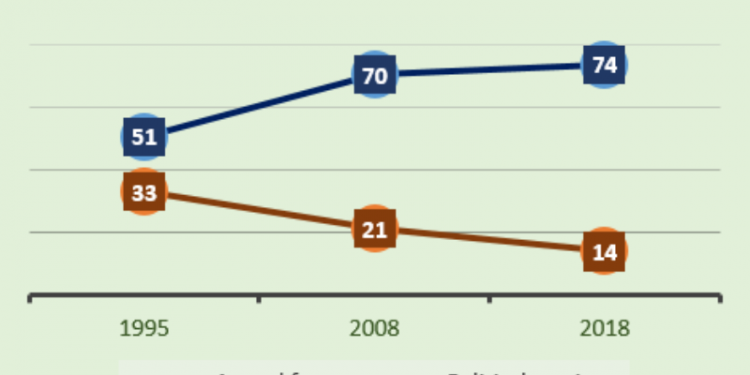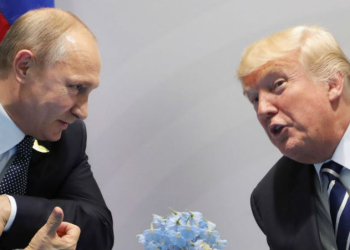Democracy’s need for political parties is fundamental is almost never questioned but some countries have figured out how to have democracy without political parties. These smart nations are the six Pacific islands of Nauru, Tuvalu, Palau, the Marshall Islands, Kiribati and the Federated States of Micronesia. I am sure that very few readers of this column have ever even heard of them. But we Georgians know them, at least Nauru and Tuvalu and not because our high school geography curriculum is biased towards the largest ocean. It’s simply because these two democracies (considered as such by reputable international organizations) decided to toe the Kremlin’s line and recognize occupied territories of Georgia as independent states in 2011.
These democracies basically exist in these countries because of their very small island populations and the existence of clannish traditional institutions that commonly facilitate party interests. Some of them do not even have a capital city or army but alas, they are far from us and protected by Australia, New Zealand and UK, so there is no chance to send a Georgian aircraft carrier or nuke them into the ocean.
Political parties do exist in Georgia. Except for the Soviet period, we have been enjoying multiparty democracy. In free Georgia, especially during the last 28 years, much effort has been made to strengthen the culture of political parties. Thanks to the dedicated support from the European Union and the United States, our political landscape became professional, despite a couple of instances when governments were changed unconstitutionally (and on-going temptations by some to do so again).
The Army – another vital institution in any democracy – was always an important and integral part of Georgian society. Fifteen men and one women headed the Georgian Army since independence in 1990. Not all of them were nice and soft-spoken, and only a few were truly dedicated ministers. However, the army never interfered in politics or joined special police troops in cracking down on peaceful demonstrators, at least for the last 25 years.
At first glance, this seems strange since some political authorities in Georgia’s recent history appeared to be ready to do anything to secure their power, including the deployment of the army on streets against civilians or alleged terrorists. But personally, I think that our army stirred clear of such trouble not only because we had strong civilian control in place, but also because the Georgian Army quickly Westernized, especially compared to other institutions. By Westernization I mean very straightforward things: for many years now, Georgian officers have been studying at the best EU and US military academies, thousands of men and women served in Iraq, Kosovo and Afghanistan and fought shoulder to shoulder with our allies, constant training by the most advanced militaries, our desire and hard work to introduce NATO standards and of course our dream – to one day became part of the North Atlantic Treaty Organization.
In parallel to institution building and training, the Georgian army had to fight against Russia’s regular army on several occasions to defend our territorial integrity. Unfortunately, but not surprisingly, we lost these wars. Nevertheless, Georgian society has never been angry or disappointed with the army. Georgians have always had positive attitudes towards the institution and positive sentiments over the last two decades have significantly grown.
Today, a large majority of Georgians (74%) has either a “great deal” or “quite a lot” of confidence in the army, rising 23% since 1995 (51%). Interestingly, based on recent opinion surveys, young Georgians are the most supportive among other age cohorts, as are men and rural dwellers. Alongside the Church, the Georgian Army is the most trusted institution, but the former has suffered significantly after recent prison scandals and internal controversy.
But when it comes to confidence of political parties over the last 25 years, the trend moves backwards. It has decreased from 33% in 1995 to only 14% in 2018. This is a sad story because we need multi-party democracy and confidence in the party system should stay high. The only good story here is that despite this downturn it is not at all likely that the Georgian Army will take over power and run the country.
Table 1. Confidence in Army by demographic variables (%)

Source: GORBI, European Values Survey, 2018; World Values Survey, 1995.
Political parties are described as groups of people that share similar political ideas but in Georgia, we always had a group of people who shared the same political leader. Consequently, the multiparty system has suffered and lost confidence among the public. How to restore this confidence is not a million-dollar question, at least for me and I understand that I may be very subjective here. It is like in real life or in business, the market should regulate everything with minimal state intervention. The Georgian state is spending millions of Gel in support of key political parties and our western friends are also spending serious amount of resources to strengthen the political party system via trainings and knowledge sharing. None of this seems to be working all that well, at least based on population surveys.
And here is my free advice: we need new, young and dynamic faces, no longer the same losers that have dominated the TV screens for decades but never managed to win any elections or even (and this is true for most of them!) overcome a threshold without a “little bit of help” from above. I am not heartless, and I know most of them in person, but those parties and politicians receive money from political dark holes and even worse – Russia. They simply failed to secure room via competitive elections and this is happening over and over again. I think it is high time that party leaders stepped down and gave the floor to younger members, fresh faces, more dynamic and fast thinking people with the bigger picture in mind. Experimenting will not harm most of them and it would provide a small opportunity for change.
Georgia does not need Brezhnev-type politicians. We simply do not have time to wait until aging small party leaders go into retirement. The widespread idea that the young cannot run a country is simply false. I have read several criticisms about the new Prime Minister, Mr. Bakhtadze (36) who is disliked by some social media activists because of his age and I am dead sure that most of these fellows still enjoy listening to members of the 27 Club. When it comes to determining an appropriate age for governing or managing things, I always mention one great fact: the average age of the Apollo space program scientists was 28. They solved unseen problems and landed 12 men on the Moon. Compared to these challenges, managing Georgia should not require an age limit of over 50.
Note: I would like to extend special appreciation to Ani Lortkipanidze who assisted with the analysis and charts featured in this article
GORBI is an exclusive member of the Gallup International research network and has more than two decades of experience in survey research (gorbi.com)





























Discussion about this post